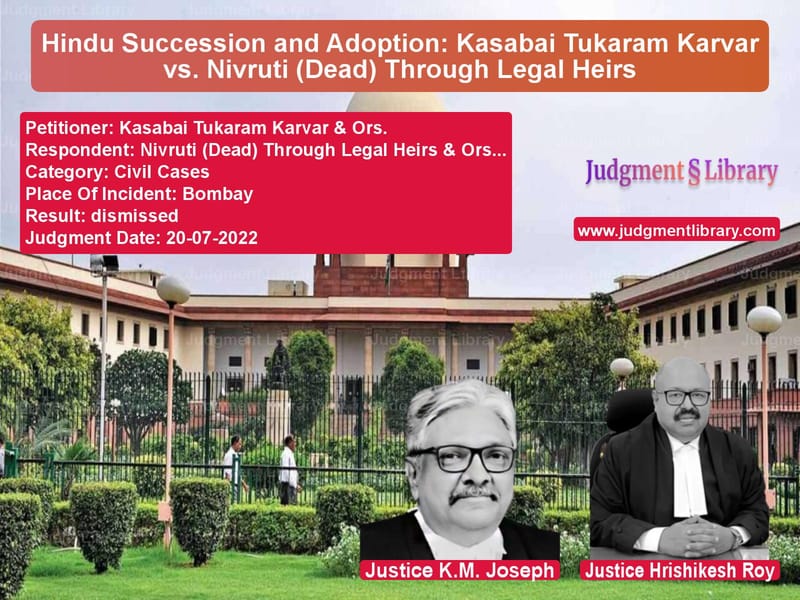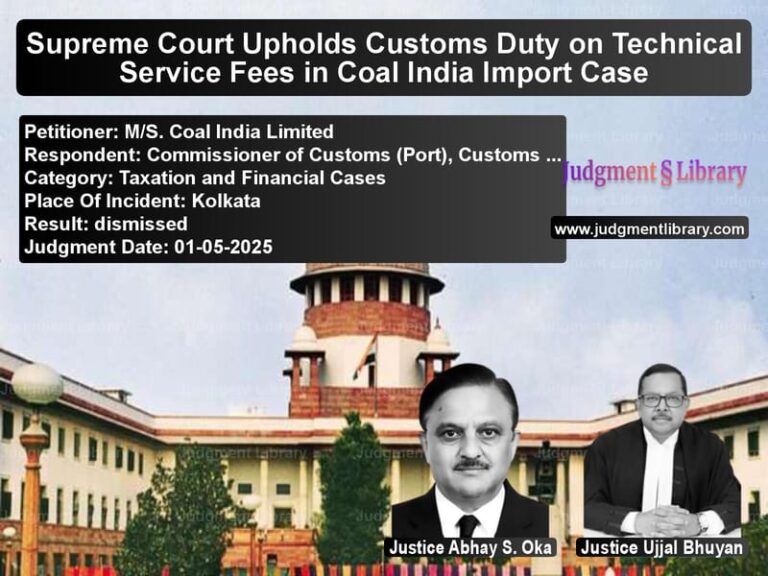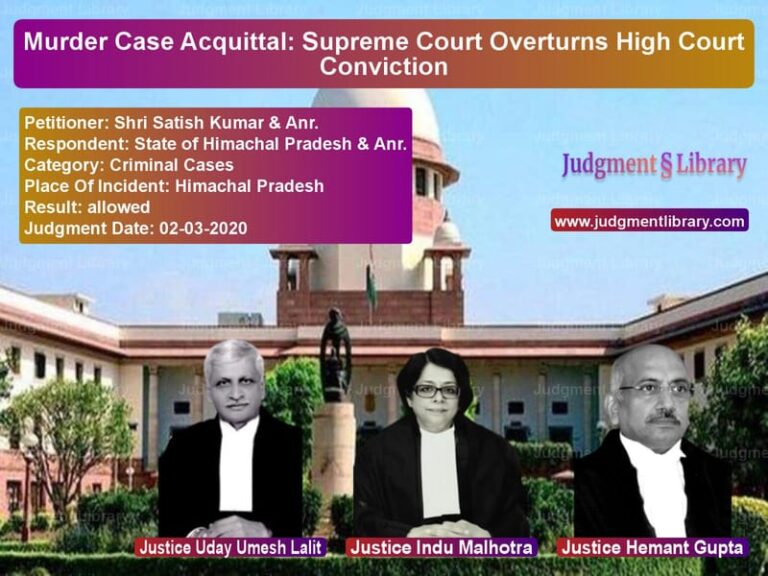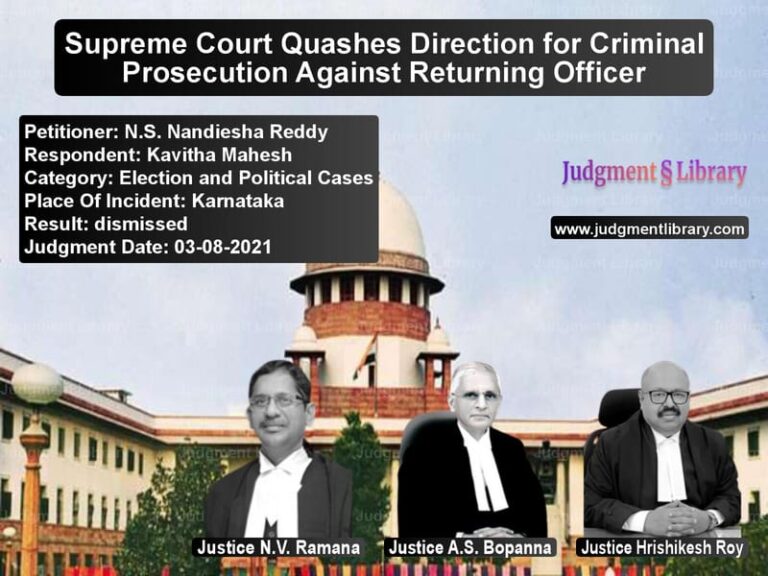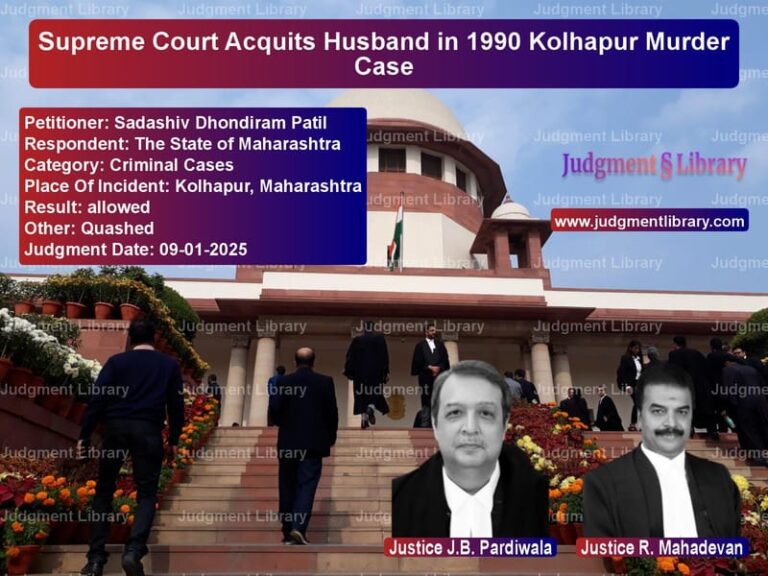Hindu Succession and Adoption: Kasabai Tukaram Karvar vs. Nivruti (Dead) Through Legal Heirs
The case of Kasabai Tukaram Karvar & Ors. vs. Nivruti (Dead) Through Legal Heirs & Ors. is a significant judgment concerning the rights of daughters in Hindu joint family property, the doctrine of relation back in adoption cases, and the impact of remarriage on inheritance. The case revolves around a dispute over the partition of ancestral property and the rights of an adopted son versus a biological daughter under Hindu law.
Background of the Case
The dispute pertains to the inheritance of the properties left behind by one Kushaba, who had three wives. His first wife died childless, while his second and third wives bore children. The plaintiff, Kasabai, was born to the third wife after Kushaba’s death, making her a posthumous child. The first defendant, Nivruti, was adopted by the widow of Kushaba about a year after his death through a registered deed.
Kasabai filed a suit seeking partition of the ancestral property, claiming an equal share with the adopted son. The trial court and the first appellate court ruled in her favor, holding that she was entitled to a half-share. However, the High Court overturned these findings, ruling that the adopted son had full rights over the property due to the doctrine of relation back, effectively disinheriting Kasabai. The matter then reached the Supreme Court.
Arguments by the Petitioner (Kasabai)
The petitioner, Kasabai, through her counsel, contended that:
- She was a natural-born daughter, present in her mother’s womb at the time of her father’s death, and therefore had an inherent right to inherit the property.
- The doctrine of relation back, which states that an adopted son is considered to have been born at the time of the adoptive father’s death, should not operate to deprive a legitimate heir of her rights.
- The Hindu law principle prevailing in the Bombay region, where the parties hailed from, recognized daughters as heirs to ancestral property.
- The property was joint family property, and the mother’s remarriage did not affect the daughter’s inheritance rights.
- Even if the adopted son was to be recognized as the legal heir, she should at least inherit her deceased mother’s share.
Arguments by the Respondent (Adopted Son, Nivruti)
The respondent countered with the following arguments:
- As per the doctrine of relation back, his adoption meant that he was deemed to have been a coparcener from the date of Kushaba’s death, thereby nullifying any claim by the daughter.
- The High Court rightly applied settled legal principles in holding that once an adoption is valid, it relates back to the time of the adoptive father’s death, making the adopted son the sole heir.
- The plaintiff’s argument that her mother’s share should devolve upon her was unsustainable since the mother’s remarriage divested her of any claim to the property.
- Legal precedents upheld that an adopted son could divest others of their rights in the property, including posthumous daughters.
Supreme Court’s Judgment
The Supreme Court, in a detailed analysis, upheld the High Court’s judgment, reaffirming the doctrine of relation back. The judgment observed:
“It is established law that the adoption by a widow relates back to the date of the death of the adoptive father, which, in this case, took place in 1948. The complexity of the case arises from the application of this legal fiction of ‘relation back’ and its impact on inheritance rights.”
The court cited precedents from Govind Hanumantha Rao Desai vs. Nagappa (1972) and Shripad Gajanan Suthankar vs. Dattaram Kashinath Suthankar (1974), where it was held that an adopted son is treated as if he were born at the time of the adoptive father’s death.
The court further stated:
“If, therefore, there was a coparcenary in existence when the adoptive father died, then whether it came to an end by the death of the last surviving coparcener or by subsequent partition among the remaining members, an adoption validly made by the widow of the deceased coparcener would have the effect of divesting the estate in the hands of the heir to the last surviving coparcener.”
Impact of the Doctrine of Relation Back
The judgment explained that:
- The adopted son was to be considered as having rights in the joint family property from the date of his adoptive father’s death.
- Since the succession opened before the Hindu Succession Act, 1956, the law as it stood in 1948 applied.
- Under the prevailing Hindu law, sons were preferred over daughters in matters of inheritance, and the adoption effectively nullified the daughter’s claims.
- The remarriage of the widow further reinforced that the mother’s share did not pass on to her daughter but rather merged with the adopted son’s inheritance.
Observations on Daughters’ Rights
The court acknowledged that under modern Hindu law, particularly after the 2005 amendment to the Hindu Succession Act, daughters have been granted equal rights in coparcenary property. However, in this case, since the succession had already opened in 1948, the amendment did not apply retrospectively.
The court remarked:
“While it is true that recent legislative changes have sought to ensure gender equality in matters of inheritance, we are bound to apply the law as it stood at the time of succession. Under the pre-1956 law, a son took precedence over a daughter, and an adopted son was treated as a natural-born son with full inheritance rights.”
Final Verdict
The Supreme Court dismissed the appeal, ruling in favor of the adopted son. The judgment concluded:
“The plaintiff-daughter, in view of the notional existence of the adopted son by virtue of the doctrine of relation back, is not entitled to a share in the property. The first defendant, as the adopted son, is the sole legal heir to the estate.”
Key Takeaways
- The doctrine of relation back ensures that an adopted son is treated as if he were born at the time of the adoptive father’s death.
- Under pre-1956 Hindu law, daughters had limited inheritance rights compared to sons.
- The adoption of a son divests other heirs, including daughters, of their claim to property.
- Remarriage of a widow further alters inheritance rights, especially under the Mitakshara school of Hindu law.
- While modern laws have corrected gender biases in inheritance, pre-1956 cases continue to be governed by old principles.
Petitioner Name: Kasabai Tukaram Karvar & Ors..Respondent Name: Nivruti (Dead) Through Legal Heirs & Ors..Judgment By: Justice K.M. Joseph, Justice Hrishikesh Roy.Place Of Incident: Bombay.Judgment Date: 20-07-2022.
Don’t miss out on the full details! Download the complete judgment in PDF format below and gain valuable insights instantly!
Download Judgment: kasabai-tukaram-karv-vs-nivruti-(dead)-throu-supreme-court-of-india-judgment-dated-20-07-2022.pdf
Directly Download Judgment: Directly download this Judgment
See all petitions in Succession and Wills
See all petitions in Property Disputes
See all petitions in Contract Disputes
See all petitions in Legal Malpractice
See all petitions in Other Cases
See all petitions in Judgment by K.M. Joseph
See all petitions in Judgment by Hrishikesh Roy
See all petitions in dismissed
See all petitions in supreme court of India judgments July 2022
See all petitions in 2022 judgments
See all posts in Civil Cases Category
See all allowed petitions in Civil Cases Category
See all Dismissed petitions in Civil Cases Category
See all partially allowed petitions in Civil Cases Category

